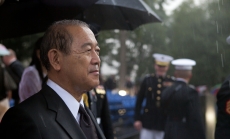The CPD Blog is intended to stimulate dialog among scholars and practitioners from around the world in the public diplomacy sphere. The opinions represented here are the authors' own and do not necessarily reflect CPD's views. For blogger guidelines, click here.
Since at least the late 2000s, I have been observing – sometimes organizing, and sometimes participating in – diverse forums featuring different combinations of politicos, policy decision-makers, academics, and applied practitioners, which have broached the relationship between “culture” and “security,” sometimes in overlapping but often in notably different ways. At times, the purpose is to ascertain how new cultural developments might disrupt established security goals.

Ichiro Fujisaki, Japan’s ambassador to the United States, spoke mainly about PD in one of his final appearances.
Let me say at the outset, I am proud to be an American. I believe that with my citizenship comes a responsibility to be engaged and pay attention not just to what is happening domestically but also to what is happening in the world. In addition to being a proud American, I also see myself as a citizen of the world. So much of America is interconnected with the world and much of what we do here in the U.S. – from who we elect, to the goods and services we buy, to the media we consume – touches millions of lives around the globe.

Thanks to sports diplomacy, American and British sports fans alike can take interest in the football that their counterparts are watching.
For me, three long-term drivers of relationships between the peoples of the world are access to opportunity, access to information, and access to technology. And of course they are completely intertwined.
I am optimistic about Australia’s campaign for a temporary seat on the United Nations Security Council (UNSC). To be clear, I am optimistic about the campaign, rather than the contest. It is almost impossible to predict the outcome of the three-way competition between Australia, Finland and Luxembourg for the two available seats; a contest that will be determined by the UN General Assembly (UNGA) in New York on 18 October.
WASHINGTON – David Ensor, Director of the Voice of America, was the lead speaker this week at the first monthly USC public diplomacy lunch forum here on Monday.
Ensor began by discussing U.S. international broadcasters’ coverage of the 2012 election campaign, noting that tonight’s debate will be carried live by several VOA networks.
APDS Blogger: Michael Duffin
When I hear ‘sports diplomacy’ evoked in conversation I often wince, knowing that 99% of the examples do not live up to the standards of the term.
Athletes and coaches who work for a team outside of their country for no purpose other than for a love of the game and personal gain do not always qualify. There is no universal definition of public diplomacy, but from my perspective there must be intention on the part of the actor to influence opinion.
Pages
Visit CPD's Online Library
Explore CPD's vast online database featuring the latest books, articles, speeches and information on international organizations dedicated to public diplomacy.
POPULAR ARTICLES
-
January 29
-
January 20
-
January 28
-
January 2
-
January 8
Featured Blogger
Join the Conversation
Interested in contributing to the CPD Blog? We welcome your posts. Read our guidelines and find out how you can submit blogs and photo essays >.








